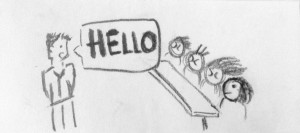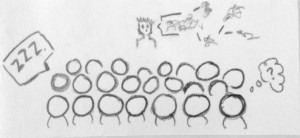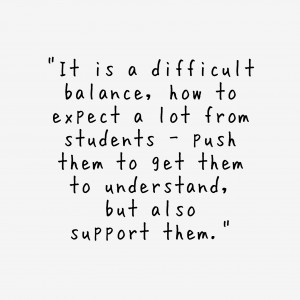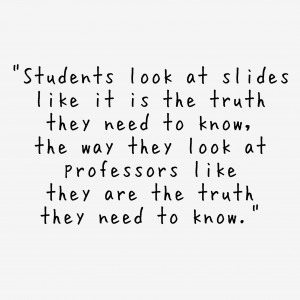 A year later I saw Prof. Warley’s name for ENG280, which fit into my schedule, and so enrolled myself into his class. Although the content of this class was drastically different, his teaching style remained distinctive in its approach. This got me thinking about how different classroom experiences are probably more influenced by teaching methods than content.
In our interview, Prof. Warley explains that he prefers to ask questions, and listen to feedback – what the students did or did not understand, what they liked, did not like, and what bored them.
A year later I saw Prof. Warley’s name for ENG280, which fit into my schedule, and so enrolled myself into his class. Although the content of this class was drastically different, his teaching style remained distinctive in its approach. This got me thinking about how different classroom experiences are probably more influenced by teaching methods than content.
In our interview, Prof. Warley explains that he prefers to ask questions, and listen to feedback – what the students did or did not understand, what they liked, did not like, and what bored them.
 Any comments and questions students bring up in his class are always met with,
“Where do you get that from the text? Show me exactly where.
Any comments and questions students bring up in his class are always met with,
“Where do you get that from the text? Show me exactly where.
Having to follow up a perhaps spur of the moment thought with textual evidence helped me as a student to develop a critical consciousness of my own thought processes, and why I was making the claims I was making. The high level of engagement expected of students is part of Warley’s attempt to model seriousness, “this stuff matters, this stuff is also hard.”
When asked about what he expects from students, his answer is “effort”. As a professor, he notices that students walk into bigger classrooms with lowered expectations, as the large numbers prevent frequent student-teacher interaction. His energy therefore, goes toward developing as interactive an environment as possible, while upholding strict expectations.
 As a student, I know that in a class of 150, I expect to be much less engaged than in a class of 50, and this can drastically affect how much attention I pay in lectures, or the preparation I put before class, and how I think about the content of those lectures.
Over the years, I came to realize that developing critical thinking made a really big difference in my classroom performance and assignment approach, and these are things I have talked about before in previous blog posts.
Warley’s teaching emphasis on students taking ownership of their thoughts and opinions, is his way of getting students to begin to critically assess the material, instead of waiting for cues from his position as a professor.
As a student, I know that in a class of 150, I expect to be much less engaged than in a class of 50, and this can drastically affect how much attention I pay in lectures, or the preparation I put before class, and how I think about the content of those lectures.
Over the years, I came to realize that developing critical thinking made a really big difference in my classroom performance and assignment approach, and these are things I have talked about before in previous blog posts.
Warley’s teaching emphasis on students taking ownership of their thoughts and opinions, is his way of getting students to begin to critically assess the material, instead of waiting for cues from his position as a professor.
 Sitting down with Prof. Warley was a fun and enjoyable way to expand classroom interaction without the pressure of graded classroom participation.
I’m sure office hours are there for this very reason, to give students the opportunity to have this kind of exposure, to have interesting dialogue, to expand the scope of what happens in the classroom.
Maybe it’s time to visit to a professor’s office.
You never know what conversations you might have.
Sitting down with Prof. Warley was a fun and enjoyable way to expand classroom interaction without the pressure of graded classroom participation.
I’m sure office hours are there for this very reason, to give students the opportunity to have this kind of exposure, to have interesting dialogue, to expand the scope of what happens in the classroom.
Maybe it’s time to visit to a professor’s office.
You never know what conversations you might have.
0 comments on “The Office Hour Interview: Professor C. Warley”